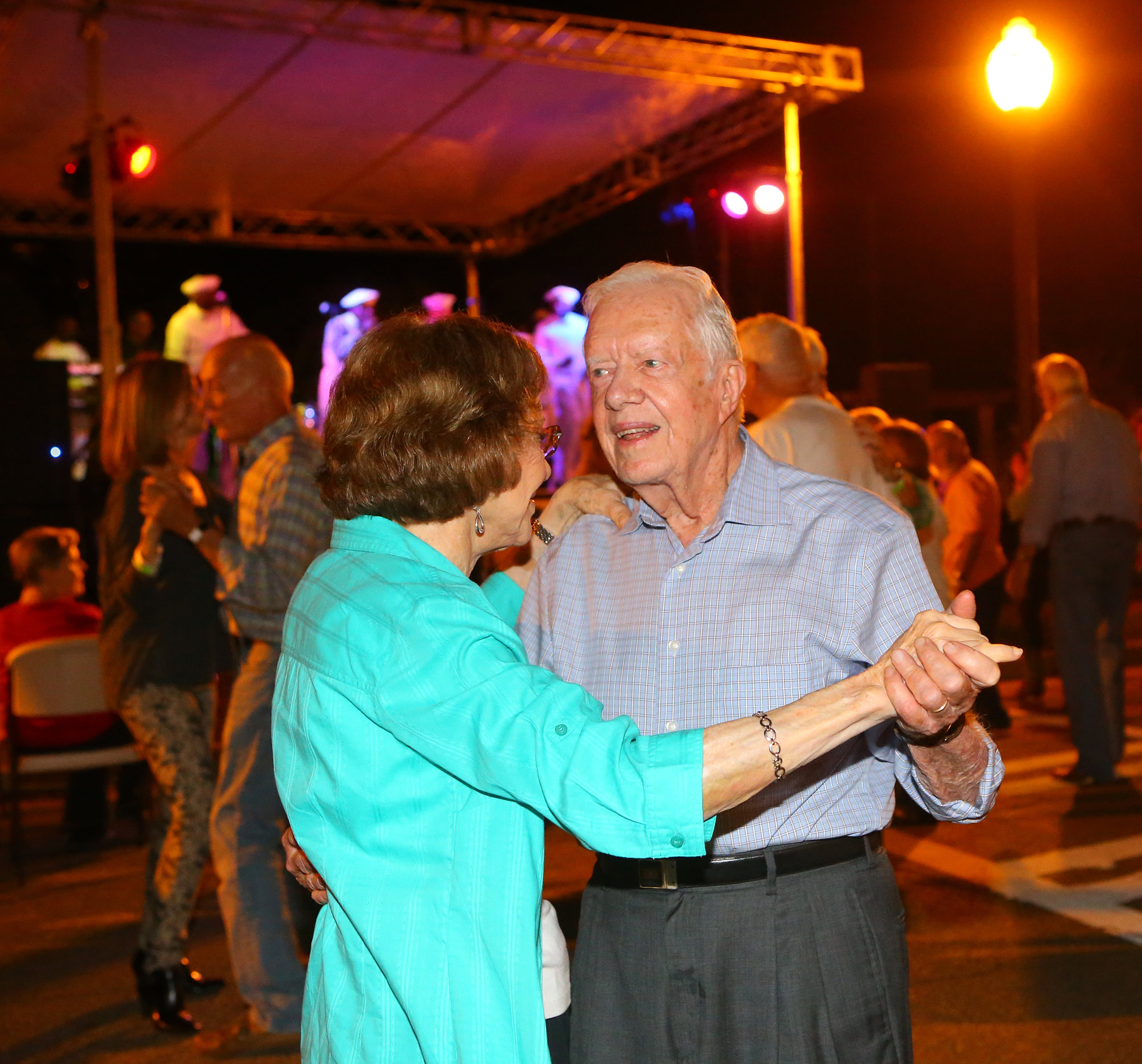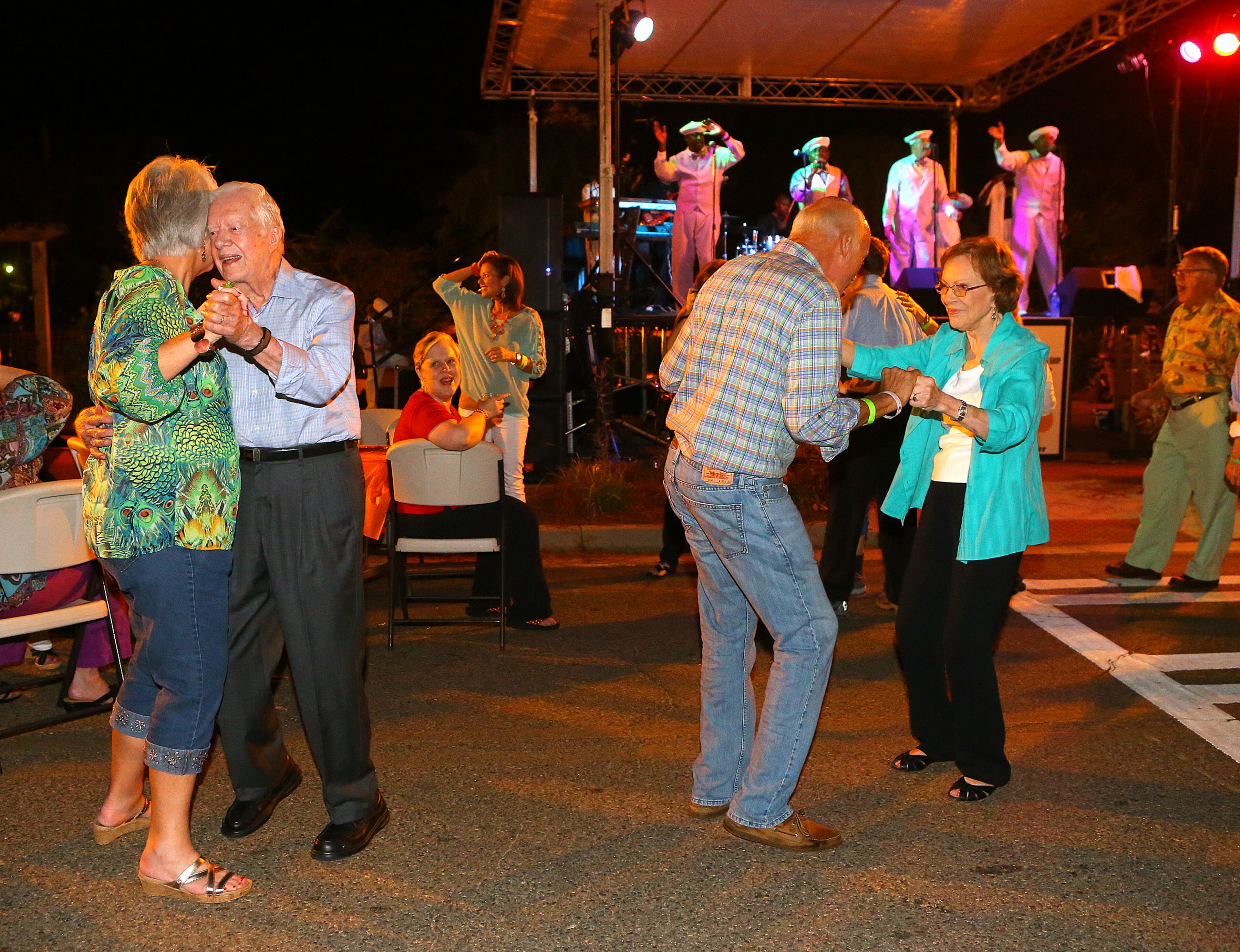A 90th celebration for Jimmy Carter in Plains

























Plains — The party had all the right festive touches:
Colorful balloons. “Happy Birthday” sung loudly, if not exactly on key, by all the guests. Secret Service agents hovering protectively near the peanut butter ice cream.
Best of all, the birthday boy, who may have surprised even himself by how genuinely happy he was to be there.
“I didn’t know there were this many people in Plains,” former president Jimmy Carter marveled on Sunday afternoon as he climbed out of a car in Maxine Reese City Park and saw more than 200 residents of his little hometown gathered for his 90th birthday ice cream party. “There are no friends like you.”
Until now, Carter had largely treated the hoopla surrounding his Oct. 1 birthday with the same bemused tolerance he exhibits toward the giant peanut that's long sat along a roadside in Plains (Friends say he's not a big fan of the grinning goober, but knows its a good tourist draw for the Plains he loves). Everyone kept bringing up his 90th birthday, he'd said in several conversations over the last month. In China alone, where he and his wife, Rosalynn, had recently spent eight days, he'd received eight birthday cakes.
But you can't ignore someone's 90th birthday, can you? On the other hand, what do you get a guy who already has everything from a Nobel Peace Prize to a spin as governor of Georgia and leader of the free world?
That’s easy.
Plains.
“Our kinfolk, our neighbors, our childhood friends still live here,” Carter explained last week in a phone interview from “the only home we’ve ever owned” — the modest ranch house he and Rosalynn built in Plains in 1961, some eight years after his father’s death caused him to reevaluate his own life and come home from his promising career as a globetrotting Naval officer. “In every respect, we feel like this is where we belong.”
The feeling is mutual in this small southwest Georgia town of maybe 700 people nestled near Americus. It's where both Carters were born, where they'll be buried and where they continue to spend most of the time that they're not at the Carter Center in Atlanta or traveling for work or other reasons. That includes, right now, supporting grandson, Democrat Jason Carter, as he attempts to unseat Gov. Nathan Deal in November.
“A third of the time here is our goal,” Carter said about Plains, where he fills his time writing, woodworking, teaching Sunday School and being fully engaged in local civic and social affairs. “When we’re not here, it feels temporary.”
Sunday’s party was a one-off, a very special gift from Plains to one of their own who’s stubbornly insisted on staying that way. The rest of the weekend? It was nothing special, locals say. Not if you know how much “Mr. Jimmy” likes it here.
Saturday was the 18th Annual Plains Peanut Festival. Carter spent more than an hour at the historic train depot presenting awards to the winners of road races and an annual postcard design contest for schoolchildren (This year’s perhaps unavoidable contest theme: “Celebrating 90 Years! Plains, Peanuts and a President.”)
Later, during the Main Street Parade, he and Rosalynn waved from the balcony of the Plains Historic Inn as everyone from Shriners and Mr. Peanut to Carter Center interns and the Teeny Miss Georgia Turpentine Queen passed by below. Some 12 hours after his day started, it ended with Carter gliding with his wife of 68 years around Main Street at the Festival Dance.
Friends say the Carters will do almost anything to help Plains, with its two-block downtown, continue to thrive. But a historian who knows the former president well says he gets at least as much out of the relationship as he puts into it.
“It’s not fake,” insisted Rice University professor Douglas Brinkley, whose numerous presidential biographies include “The Unfinished Presidency of Jimmy Carter.”
“He actually gets more joy and feels more human by staying deeply involved with his hometown.”
Even more than that, Carter said, the place where he grew up directly shaped the person and leader he went on to become.
“There are two basic things that I attribute to myself somewhat proudly: One is human rights and the other is (working for) peace,” said Carter, who moved with his family at age four to a farm in the Archery community just outside of Plains, where most of his friends were African American. “I’d say my total commitment to human rights came from my experiences living among African-American families and seeing the ravages of segregation.”
Meanwhile, his great-grandfather fought in the Civil War, he himself served nearly eight years after graduating from the U.S. Naval Academy, and his oldest son, Jack, was in the Navy during the Vietnam War.
“So I’ve seen the value of teaching peace,” Carter said.
Among modern day presidents, only Franklin Delano Roosevelt stayed similarly “embedded in (his) homeplace,” of Hyde Park, N.Y., Brinkley said. But FDR, who died early in his fourth term, didn’t have any sort of post-presidency — let alone one as busy and as far flung as Carter, who led an election observation mission in Nepal last November, observed the signing of an Ethical Electoral Pact in Panama in March and will spend next week in Texas with his wife building houses for Habitat for Humanity.
His full-on engagement in national and world affairs makes his continued rootedness in Plains that much more notable. But it also can make him a lightning rod for criticism.
“I take action every now and then that’s not completely acceptable to everybody on earth,” Carter said to knowing laughs at a Carter Center town hall meeting in mid-September.
He was responding to a question about his decision to deliver the keynote address at the Islamic Society of North America’s annual convention in August. Noting that officials of the Obama and George W. Bush administrations had also addressed the group in the past, Carter said he’d been invited to speak about violence directed at women and girls around the world, the subject of his latest book.
The next night, Carter was back onstage in a gym at Emory University for another town hall meeting — this one his annual, mostly good-natured grilling by members of the freshman class.
“I approach this session always with trepidation,” Carter, a University Distinguished Professor, jokingly informed the students, whose questions ran the gamut from dealing with ISIS and the tensions in Ferguson, Mo., to his take on the movie “Argo” and what, if anything, remained on his bucket list.
OK. Maybe the man who already has everything really wants one more thing.
“If I had one bucket list (item) to ask for,” Carter said, grinning, “It would be to go to the next governor’s inauguration and see my grandson standing there.”
He may or may not get his wish. Right now, the race between Deal and Jason Carter is extremely close, with polls that had been giving the Republican governor a slight edge starting to tighten. The younger Carter has tapped his grandfather’s donor network and Democratic appeal to mount a serious challenge. But his pedigree cuts both ways in a red state where Republicans have been eager to link the ex-president’s more left-of-center stances to his grandson.
No wonder Jimmy Carter describes Plains as a “haven” where they “can almost completely relax.” Here, he’s pretty much treated like the guy next door. If “next door” had a Secret Service guard post, that is.
“I was over there at the house one day and I saw a Harry Potter book. I said ‘Who’s reading that?’” said Nelle Ariail, whose late husband, Dan, was the longtime pastor at Maranatha Baptist Church (where Carter turned up to teach Sunday School to a packed house the morning after the Peanut Festival). “Jimmy said, ‘I am. We’re going on a family trip. They have a Harry Potter section and I don’t want the grandchildren to know more than me.’”
For the ice cream party, invitations appeared at the homes of everyone with a rural route address or P.O. box in Plains. Carter was so touched by the enthusiastic turnout, he planted himself between the crowd and the table of goodies, so “you’ll have to shake my hand to get ice cream.”
In fact, the wiley old politician confided between bear hugs with friends old and new, he wasn’t all that surprised.
“Some of 'em like me,” Carter said. “But I knew they all like ice cream.”
A JIMMY CARTER TIMELINE
Oct. 1, 1924 — James Earl Carter Jr. is born in Plains, the first child of James Earl Carter, a farmer and businessman, and Lillian, a registered nurse.
Summer 1946 — Ensign Jimmy Carter graduates from the U.S. Naval Academy in Annapolis and marries Rosalynn Smith.
Oct. 9, 1953 — After his father’s death, Jimmy resigns his commission and returns to Plains to operate his family’s peanut warehouse business.
Nov. 6, 1962 — Elected to the Georgia Senate.
Nov. 3 1970 — Elected governor of Georgia on his second try. Two months later, declares in his inaugural address that “the time for racial discrimination is over.”
Nov. 2, 1976 — Elected 39th president of the United States, defeating incumbent Gerald Ford.
Sept. 7, 1977 — Signs a treaty that will surrender U.S. control of the Panama Canal by 1999.
Sept. 17, 1978 — Israeli Prime Minister Menachem Begin and Egyptian President Anwar Sadat sign the Camp David accords, mediated by Carter, under which Israel agrees to return Egyptian territory conquered during the ’73 war, and Egypt in return extends full diplomatic recognition to Israel.
Nov. 4, 1979 — Iranian students take control of the U.S. Embassy in Tehran, seizing hostages.
Jan. 20, 1980 — Carter announces U.S. boycott of the Moscow Summer Olympics due to Soviet invasion of Afghanistan.
April 24, 1980 — Malfunctioning helicopters in the Iranian desert kill eight servicemen and force Carter to abort a military effort to rescue the embassy hostages.
Nov. 4, 1980 — Ronald Reagan overwhelmingly denies Carter’s reelection bid.
Jan. 20, 1981 — Reagan is inaugurated president. Minutes later, the hostages in Iran are released.
Sept. 1, 1984 — Jimmy, Rosalynn and other Georgia volunteers board a Trailways bus from Americus to New York for a Habitat for Humanity construction project. The trip draws worldwide media attention.
Oct. 2, 1984 — Construction begins in Atlanta on the Carter Presidential Center, dedicated to the advancement of peace and human rights.
1990: Carter monitors elections in Nicaragua, Haiti, Guyana and the Dominican Republic.
Sept. 17-18, 1994 — Carter, former Sen. Sam Nunn and former Joint Chiefs of Staff Chairman Colin Powell go to Haiti to inform the Haitian dictatorship that it must step down and allow a previously elected president to take power or risk invasion by the United States.
Jan. 18-21, 1996 — Carter helps oversee the first democratic elections held by the Palestinians, in which Yasser Arafat is elected president with 88 percent of the vote.
May 12-17, 2001 — The Carters travel to Cuba at the invitation of Fidel Castro. Carter silences some critics by sharply rebuking Castro during a speech televised in Cuba.
Oct. 11, 2002 — Carter receives the Nobel Peace Prize “for his decades of untiring effort to find peaceful solutions to international conflicts, to advance democracy and human rights, and to promote economic and social development.”

